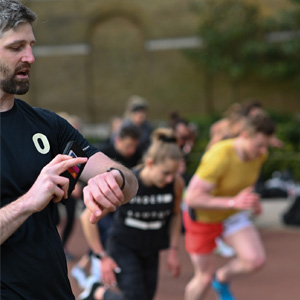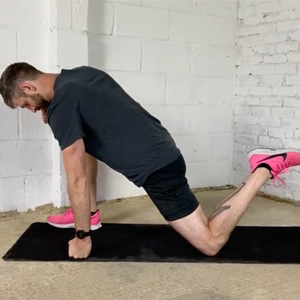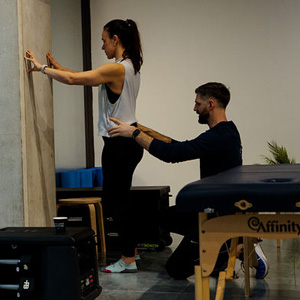
Culture
TASCHEN Warehouse SaleGet ready for Taschen’s unmissable book sale spanning tomes from art, design, and culture lovers, running Wednesday 4th to Sunday 8th February.

We had the pleasure of catching up with duo Fletch and Laura, the masterminds behind your weekly run clubs, Onetrack. From their expert top tips for beginners to seasoned pros, here’s everything OneTrack offers.
So, tell us a little more, what is Onetrack and where did it come from?
Onetrack empowers everyday athletes with elite training knowledge – bridging the gap between elite sport and everybody in the pursuit of performance. We provide access to physiological testing and intrinsic biomechanical assessments and personal training in our studio spaces in Farnham & Soho as well as offering online run coaching to those further afield. Onetrack Run Club is our community offering; a support crew to motivate you and an expert coach to guide you.

It’s great that Onetrack caters for all abilities, but I’m a beginner. Where do I get started with running? What are your top tips to start successfully?
When you’re just starting out on a running journey, it can be tempting to set goals, but try not to focus on the numbers. It’s not about how far or fast you’re running, but rather the fact you’re getting out there at all. Motivation will come and go – and it’s important to understand this – but what you really want to develop is discipline and patience to slowly build an aerobic base. Find the joy in running and don’t let progress define whether you like it or not. Some days, you may not feel like you are improving, but that doesn’t mean you should stop altogether.
My top tips would be to go easy and be mindful of your recovery. Running faster doesn’t make you a better runner. Aim to run at a pace where you can easily have a conversation. If this means fast walking, start with that. At the same time, doing nothing is the best way to optimise your recovery. There isn’t much evidence out there to suggest we can speed up or enhance recovery. Resting, fuelling and hydration are the biggest hitters in getting you back to your best.
I’ve seen you host a Run Club at Duke of York Square, how I get involved?
Yes, we have interval sessions on Tuesday and Thursday at 7pm for runners of all levels. Each session lasts an hour with coaching through a warm-up, drills and a time-based workout. As the intervals are based on time and effort, everyone starts and stops running at the same time so no one is ever last to cross the finish line. It also means that if you’re fast, you’re maximising your workout and never having to wait for a lap to be completed. Win win for all levels!
You can sign up to one of our sessions at the Duke of York Square track here: https://www.onetrack.club/chelsea-run-club

Some days are harder than others. What potential external factors mean some runs are harder than others?
There are so many factors, including things like sleep, nutrition, increased training load and stage of cycle for women. The important thing is to listen to your body and what it needs. For example, if we increase the amount of weekly mileage too quickly then we may risk injury. The more time we spend on our feet and the more experience we get, the more we can start to distinguish between what should feel hard (like a harder intensity workout like intervals) and what feels hard because we may have done too much or may have not recovered or fuelled enough.
How can I effectively alleviate the intense muscle soreness that follows a challenging run?
Each time we run, as well as building endurance, we cause damage to our muscles. This may sound shocking but it’s part of the process of how our muscles adapt to become better at running. As tempting as it is to continue to push your body harder and further to support more adaptations, rest and recovery is paramount.When asked whether there was any evidence that recovery can be enhanced through products or supplements, an expert we recently worked with, Dr John Fernandes, told us:
Considering muscle function and soreness as the main marker of recovery, then a lot of recovery methods don’t work. I’d argue that most of them are a marketing ploy! But some do show promising results e.g. compression garments, omega 3 fatty acids, vitamin D. But there are two important things to consider. 1) certain recovery methods blunt the inflammatory response, which can be helpful for recovery, but likely blunts adaptation. So, they could be used during competition time, but should probably be avoided out of season. 2) does your recovery really need to be enhanced? Or is planning and supporting your recovery enough (i.e. taking time between sessions, eating enough proteins and calories).

How important is my nutrition in supporting my runs?
Fuelling is fundamental. The key is to know what helps us for different types of sessions and what aids recovery – there’s a fantastic video workshop in our On Demand area in the app and our website by Performance Nutritionist and Professional Runner, Maddie Alm, who talks about fuelling for performance. Access to workshops like these is available as part of a monthly membership, starting at just £15 p/m.
https://www.onetrack.club/on-demand
You offer a Biomechanics Assessment – tell us a bit more. Who is it for? What does it do?
A Biomechanics Assessment is for anyone currently suffering with an injury, dealing with recurring niggles or for someone looking to completely optimise their physical performance. An expert screens all the major structures, nerves and joints to understand how the body is functioning and identifies asymmetries. If the goal is rehabilitation, then we can get to the root cause of an injury (for example, a sore knee can often be down to an issue with the foot) and then track changes over time to restore function. If it’s purely about performance optimisation, then improving overall function can be preventative and reduce the risk of injury. Crucially, it can help drive micro gains, which can make a huge difference at the elite end of the spectrum, as well as for everyday athletes.

The same with, Lactate Testing – what is it and how can it help me?
Lactate profiling is a testing protocol where exercise intensity is increased in stages, and the concentration of lactate in the blood is measured at the end of each stage, with each normally lasting between two and five minutes and there are normally six to eight stages in a test.
The point of lactate testing depends on your goal. For example, if you’re training for a marathon, this test may help you to better plan your long runs – and to know what speeds you should be aiming for during interval training. More generally, it’s a measure of the aerobic system and its ability to work at certain intensities.
What this test really looks for is the point at which you pass your lactate threshold (when lactate levels start rising above resting level and your body starts to switch to the more dominant fuel source) and your lactate turning point. If you imagine that this creates a graph with two upticks, the goal with your training – and therefore what the test can measure – is whether you can improve your values to demonstrate that your training strategy is working.
And where do you see Onetrack going in the next five years? How can we keep up?
Our north star is to support everyday athletes with more access to elite training knowledge and so we’ve got a few launches in the pipeline to enable us to do that! You can stay tuned by following us on Instagram @onetrack_club and signing up to our newsletter on our website www.onetrack.club
Keen to reap the benefits of Onetrack? Enjoy one month free access to Onetrack All Access membership with the King’s Road Privilege Card.
Find out more about Run Club here.

Get ready for Taschen’s unmissable book sale spanning tomes from art, design, and culture lovers, running Wednesday 4th to Sunday 8th February.

Pop in to Monica Vinader this Saturday 13th December from 11am to 4pm for complimentary embroidery and give your new favourite everyday bag a personal twist.
Make sure to follow us on Instagram and sign up to our newsletter to be the first to receive the latest news from the Square.